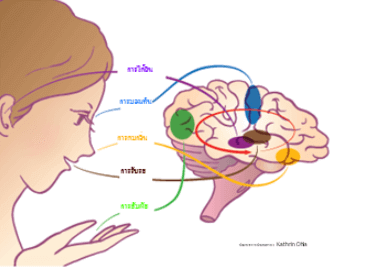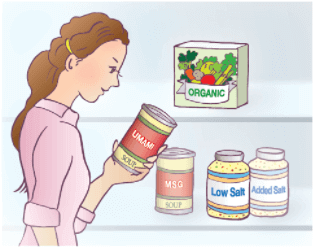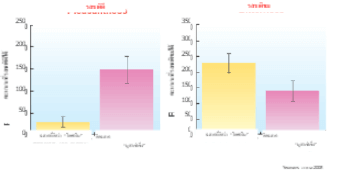The Impact of Information on the Experience of Eating
For years, Ajinomoto Co., Inc. (“Ajinomoto Co.”) has been disseminating information about umami, MSG, food and nutrition to help people in Japan and throughout the world to eat well and live well.
The most recent example of this was on December 11, 2017. Ajinomoto Co. sponsored an event called “Nature Café” organized by Nature Research that publishes high quality product and services represented by a prestigious scientific journal Nature. The purpose was to hold a traditional scientific conference, but in a relatively casual atmosphere that would promote discussion.
■ Prof. Lord Krebs Presenting to Audience at Nature Café

The theme of Nature Café was “Taste Science, Culture and Communication.” Highly renowned speakers from the USA, Germany, the UK, and Japan contributed their expertise in a wide-ranging discussion on the physiological mechanisms of taste, the reasons we like the tastes that we do, the many factors that constitute
the experience of flavor, and the impact of information on our diet.
Some of the most interesting content from this event is as follows.
■ Julie Mennela, Member of Monell Chemical Senses Center, USA, Discusses “The Origin of Flavor Preferences” at Nature Café

The Difference between Taste and Flavor
People typically use the words “taste” and “flavor” interchangeably. But scientifically speaking they’re completely different.
Taste is one of the five basic human senses. According to Nicholas Ryba, Principle Investigator at the National Institute of Dental and Craniofacial Research, USA, and one of the researchers responsible for discovering the umami taste receptors on the human tongue, this means that taste is built into the tongue and the brain, and we don’t learn the tastes based on experience. Proof of this is that newborn babies show a strong preference for sweet tastes within hours after they are born. These babies don’t need to learn what “sweet” means, or that they like it, and the reason is that the preference for sweetness is “hard-wired” into the human system. In a way, taste is an objective experience, detected on the tongue and processed by the brain.
On the other hand, according to Kathrin Ohla, Group Leader at the German Institute of Human Nutrition, flavor is a lot more complicated. The reason is that it involves all five of our senses—sight, sound, smell, touch, and of course, taste. This might sound counterintuitive at first, but consider this: would we enjoy coffee as much if it didn’t smell so good? Would we enjoy eating at a fancy restaurant if the food looked disgusting? Would an ice cream be as enjoyable if it were hard and warm instead of soft and cold?
■ Involvement of the Five Senses in the Perception of Flavor

Another critical component of flavor is experience, and this might be why people have such a wide range of opinions about which flavors we like and which ones they don’t. Basically, the more that a person is exposed
to a taste, the more they report that they like it. This might help to explain why most people think their mother makes the best food in the world.
One final factor that influences our perception of flavor is expectation. When you bite into an orange, you expect it to be sweet and juicy and citrusy—conversely, if it tasted like chicken, you would probably spit it out. The influence of expectation on our food preferences and eating habits is very important when it comes to the information we communicate about food.
Why Food Information Matters
Science has demonstrated that written and non-written information on food products elicits certain expectations in the person who will consume the food, which in turn influences our perception of flavor.
What do you expect if you see that a food has been labeled as “organic?” If you’re like most people, you expect that it will taste better, contain less fat, and contain more fiber. And you’re probably right.
But here’s a more interesting example. Subjects in a scientific study were given two containers of MSG. One was labeled “MSG,” and one was labeled “Umami.” And the one that was labeled “Umami” was actually reported to taste better. Similarly, subjects who were given a food labeled “low salt,” and then given the exact same food labeled “added salt,” reported that the flavor of the low-salt variety was less intense. And finally, a frozen savory mousse had a bitter flavor to those who were told it was ice cream, and a pleasant taste to those who were told what it really was.
■ Written and Non-Written Information on Food Influences Perception of Flavor

■ Perception of “Pleasantness” or “Bitterness” of the Same Food with Different Labels

The Truth about MSG: A Refresher
Since MSG is one of the most famous victims of misinformation in recent times, let’s take a quick review of the facts.
What Is Ajinomoto Co.’s Role in Supporting Accurate Science Communication?
At the Nature Café event, it became clear that scientists around the world have dramatically changed their stance towards umami and MSG compared to a few decades
“Is what we eat safe, healthy and sustainable among food fact and fiction? In order to communicate about science, we have to communicate about scientific evidence.”
--Lord John Krebs, Honorary Fellow and Former Principal, University of Oxford, UK
The perception of flavor is very complicated. And the fact that scientific studies have repeatedly shown that it can be manipulated using information highlights the great responsibility of companies in the business of food and nutrition to ensure that people get information that’s fair and accurate. In short, unfair or inaccurate information can hurt the general public.
ago. We at Ajinomoto Co. have shifted our approach as well—we are now fully dedicated not only to using science communication to discredit rumors and misinformation about MSG, but also to communicating about its potential benefits with regard to reduction of salt intake, appetite enhancement, and increasing satiety.
As a major company in the food arena, Ajinomoto Co. feels a great responsibility to have a positive influence on people’s eating, their health, and their lives. We take our tagline very seriously. But of course, it’s hard to make a noticeable impact based only on the nutritional content of seasonings.
What we can do is to help consumers to make better food choices by making healthy foods more appealing. And we can—and will—continue to support accurate science communication, just like we did by sponsoring the Nature Café event in London.
Our next stop is New York, where we will hold a World Umami Forum in September of this year. This large-scale event will bring scientists, researchers, dieticians, chefs, and media together to communicate the truth about umami, MSG, and the way that we eat and live. Because this is intrinsic to our mission as a company.
About Ajinomoto Co., Inc.
The Ajinomoto Group is a global company with specialties in the business of food and amino acids, guided by our leading-edge bioscience and fine chemical technologies.
Based on the corporate message “Eat Well, Live Well.”, we have been scientifically pursuing the possibilities of amino acids in supporting the healthy lives of people all around the world. We aim for future growth and continuous contribution to greater wellness by creating value through sustainable and innovative solutions for communities and society.
The Ajinomoto Group has offices in 35 countries and regions, and sells products in more than 130 countries and regions. In fiscal 2018, sales were 1.1274 trillion yen (10.1 billion U.S. dollars). To learn more, visit http://www.ajinomoto.com

